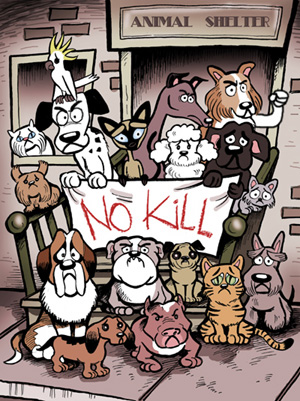I don’t like the look of this.
Stricter enforcement of a previously obscure state regulation is threatening the no-kill movement across Texas and could result in animal shelters euthanizing tens of thousands of additional pets each year, advocates warn.
A “clarification” of state rules by the Texas Board of Veterinary Medical Examiners last August already has sparked a court case and caused widespread confusion among city officials and private groups.
At issue is the veterinary care provided to animals in municipal shelters and privately-operated animal rescue organizations.
Under its rules, the Board of Veterinary Medical Examiners requires the same level of medical care and attention for shelter dogs and cats as they would receive from a private veterinarian. That means volunteers and fosters cannot perform routine care, such as administering intake vaccinations, without a trained vet present. It also means shelter veterinarians must provide individual care to each shelter animal upon intake.
Shelters say that requiring a veterinarian be present at all times would bust their budgets and reverse cities’ efforts to reach and maintain the no-kill status of euthanasia rates at or below 10 percent. Without full-time vet staff, animal advocates say, shelters eventually would fall back on euthanizing more animals since state law allows trained staff to administer lethal injections to animals.
“There’s no need for this policy,” said Rep. Jessica Farrar, D-Houston, a leading animal advocate in the Legislature who has sponsored numerous humane treatment bills. “We already have high-kill shelters and this would just exacerbate that. They’re just going to turn into euthanasia centers.”
TBVME Executive Director Nicole Oria said the Board always has interpreted the law in this way to protect public health and safety. Shelters, she said, will not be targeted by the agency because it only takes action when it receives a complaint.
Shelter veterinarians and their advocates, however, worry that could leave them open to investigations sparked by disgruntled former employees, volunteers or rival groups.
There’s already been one disciplinary action taken against a no-kill shelter that stemmed from two complaints, one of which turned out to be spurious. I’d like to see some more clarity in the law to ensure that the interests of the animals are being put first. I feel reasonably confident that Rep. Farrar will file a bill to that effect at her first opportunity. But let’s not wait that long till we get this straightened out.

